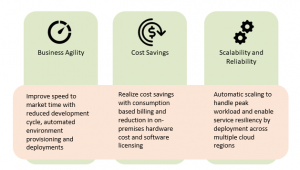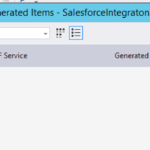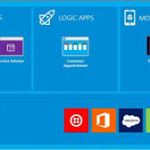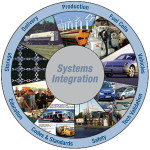BizTalk Migration to Azure iPaaS- Why Should You Care?
This article is part 1 of a 6-part series regarding BizTalk Migration to Azure iPaaS.
Part 1: BizTalk Migration to Azure iPaaS – Why Should we care?
The traditional way of integrating our systems and partners was to build custom integration on-premise solutions with middlewares, like Microsoft BizTalk Server, SSIS, or WCF services. Most of these integrations started as a point to point integrations between two systems and they expand to have many many integrations between various systems. The solution development on middleware platforms, like BizTalk Server, requires specialized skills, longer development, and testing cycles. More so, it requires upfront resource provisioning to handle high-load scenarios and is restricted by the limited monitoring capabilities of the BizTalk Server.
With Azure Integration Platform as a Service (iPaaS) offering, which consists of Service Bus Messaging, Logic App Workflow, Integration Accounts for Partner Management and Azure functions to extend the platform with code, we can now reduce our dependency on middleware solutions like BizTalk. Also, we can upgrade the middleware to Cloud and connect directly to many SaaS products, like Dynamics 365, Salesforce, SharePoint, etc.
Here are a few reasons why we should use Azure iPaaS as our Integration layer replacing BizTalk Server or any other on-premises Middleware.

Business Agility
Improved speed to market time by reducing the development cycle, automated environment provisioning, and deployments.
Azure Serverless PaaS frees the developers from the BizTalk environment installation and configurations. The developers can provide infrastructure and develop workflows from the browser-based Azure Portal. Logic Apps makes creating workflows simple with its interactive, drag-and-drop design interface, using Logic Apps Designer with minimal coding and using hundreds of pre-built connectors.
Azure DevOps platform helps faster feature rollouts by agile planning tools, source control, and automated environment provisioning, build, and deployments.
Cost Savings
Azure Logic Apps require zero upfront setup costs and we do not have to pay for infrastructure maintenance because it’s fully managed by Microsoft.
We do not pay for resources up front in serverless platforms, like Logic Apps or Azure Functions. Azure charges for resources by consumption – i.e. we only pay for what we use. If we have a connector to Office 365 with a ‘When a file is modified’ trigger, you are only charged when files are modified and subsequently trigger the action.
Another benefit is that all users of Logic Apps can develop and test integration features before deploying their workflows, without worrying about any added development licensing costs. Logic Apps brings down the cost of enterprise integration, reduces manual administrative tasks, and focuses more on deploying your code and refining your business logic.
Scalability & Reliability
With traditional enterprise application development, we plan about hosting and scaling the solution to handle peak loads and providing resources in advance.
With serverless iPaaS architecture, the platform automatically scales up and meets actual load requirements, and there is no need for provisioning extra hardware upfront. The application does not need to know how scaling works or needs to handle it. The workflows can scale from processing normal loads to handling tens of thousands of concurrent transactions within seconds and without any manual steps from the platform administrator. We can configure and deploy services across multiple cloud regions to enable service resiliency and improve latency for geographically dispersed clients.
200+ Enterprise Connectors Out of the Box
Logic App Connectors replace BizTalk Adapters in connecting apps, data, devices, and services, and provide over 200+ connectors for popular SaaS apps, including SharePoint, Dynamics CRM, Outlook, and Salesforce.
B2B and EDI integration
Azure Logic Apps provide business-to-business (B2B) integration features via its Enterprise Integration Pack that allows users to set up trading partners and exchange messages electronically (EDI). B2B exchanges use industry-standard protocols, such as AS2, EDIFACT, and X12, and Logic Apps provide message validation and transformation capabilities for XML and JSON messages.
Author:
Usman Shaheen is an Azure Integration Consultant with over 17+ years of experience in large enterprise integrations, designing and building APIs in Azure Serverless & AWS, SQL Server migrations, and PowerBI consulting with his domain knowledge in retail, utility, banking, healthcare, and manufacturing.
In part II, I’ve shared the two available migration paths i.e. Lift & Shift vs. Hybrid Integration. Part III will cover key things you need to take care of while migrating to Azure iPaaS.
Please use the form below to schedule a free assessment of your current Integration setup.
[inbound_forms id=”form_13020″ name=””]






